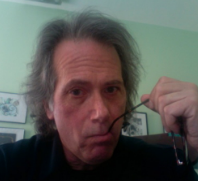Mind, Mood & Medicine with David Brizer
A Schizophrenic’s Lament – “My Father Had A Heart Attack, Do You Know How to Do CPR?”

Practically every day, when you’re walking down my block minding your own business, you are confronted by a crazy man screaming in your face.
Let’s call him George. George is a man in his 50s whose face is gnarled and whose upper body is hunched over, Quasimodo-like. It is obvious that George has led a life of intense suffering and that he is not in his right mind.
I’ll be on my way to the grocery for a bagel and coffee, usually 7 or 8 o’clock in the morning, when I am startled out of my half-asleep state by the loud unmistakable harassment of George’s voice.
George will approach you, fearlessly, without any compassion or kindness, and bellow, “My father had a heart attack, do you know how to do CPR?”
[CPR, or cardiopulmonary resuscitation, is a life-saving emergency procedure that can be administered by any person on the street who has learned the method. It simply involves pumping the chest wall and giving mouth-to-mouth deep breaths to a victim of heart attack, heart failure or stroke who has stopped breathing or whose heart has stopped beating.]
George blasts his question at strangers and has no suitable reply, whether or not you have the courage or indignation to answer him. If you wave him away, or ignore him, he will move on to the next passerby and in the very same robot-like monotone trumpet his shocking question. If you try to engage him, and take him up on his question – “Yes, I know how to do CPR” – he will stare blankly at you, not knowing or caring how to proceed.
You will walk on, either frustrated or very dismayed at George’s inappropriate and insane harassment. You will rapidly conclude, as did I, that George’s father died, probably suddenly, and George’s loss was catastrophic and left him permanently traumatized. Maybe George’s question is partly motivated by altruistic considerations; maybe he wants to save others who have dropped dead in the street from a sudden myocardial infarction.
I was trained as a psychiatrist, a medical doctor specializing in mind disorders, and I quickly gathered that George was probably schizophrenic. Schizophrenia is a poorly understood, poorly managed brain disease that manifests as hallucinations, delusions, and often, as in George’s case, as wildly inappropriate behavior.
People with schizophrenia often are plagued by paranoid belief; they are convinced that their thoughts are being controlled, or that aliens in UFOs are manipulating them. Very often schizophrenics have thought disorders, and they will repeat irrational statements over and over again: “My father had a heart attack, do you know how to do CPR?”
Even as a trained psychiatrist, with decades of experience dealing with thought-disordered delusional people like George, I often found myself reacting with irritation and anger to his intrusive early morning harassments. Didn’t he realize how aggressive, how startling and violent, his loud confrontations with complete strangers were?
Apparently not.
All too often, we know people, even loved ones, people in our own families, who are psychotic, or schizophrenic, who have little or zero insight into the grotesque aberrations of their behavior.
I have a cousin, for example, who avoids contact with everyone. Not only that, but he is convinced that his thoughts are influenced by mega-computer systems from outer space. He shits on his parents’ lawn, and they have had to call the police and mental health authorities on him too many times. (Counties in New York State are affiliated with so-called ‘CPEP’ – Community Psychiatric Emergency Programs–teams that will send a mental health worker and the police to bring an insane potentially dangerous person in for involuntary commitment to a mental hospital).
More often than not, these individuals are suffering grievously, but refuse anti-psychotic medication that can chill out the delusions, hallucinations and bizarre behavior. Some of these medications are available as monthly long-acting injections, but patients strongly object to the side effects of these, which include sedation, neurologic symptoms like tremors and other disabling involuntary muscle movements, and will do anything they can to refuse these medications.
Many families of schizophrenics report tragic tales of sorrow, involving loved ones whose crazy behaviors are tolerated as well as possible at home, in lieu of preferable, more effective anti-psychotic medication treatment. People like George and my cousin continually act out with socially unacceptable behaviors that are right on the borderline of illegal disruptive offenses that might but often don’t land them in a psychiatric hospital or prison.
Community members like me who suffer their pain and intrusiveness can respond with compassion rather than anger and only hope that advances in psychiatric medicine will yield future effective treatments that are far more acceptable to the victims of these psychotic disorders.

You must be logged in to post a comment Login